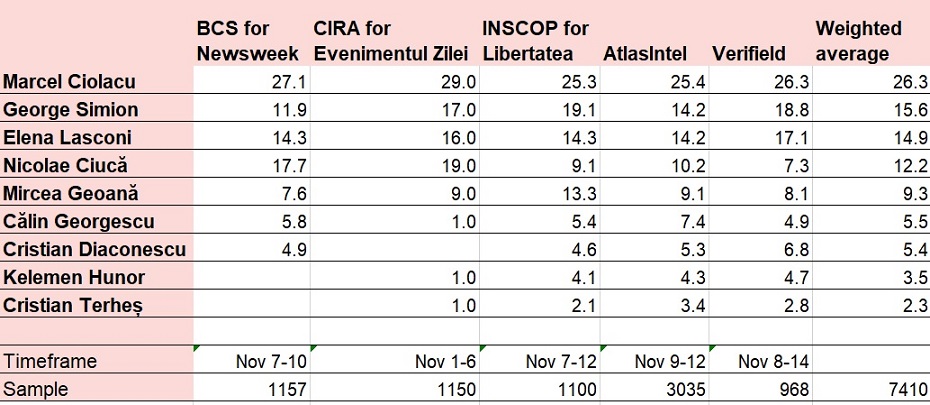Romania presidential elections 2024: Who will join PM Marcel Ciolacu in the second round according to the polls?



PM Marcel Ciolacu, the leader of the Social Democratic Party (PSD), is almost sure to win the first round with a comfortable score of over 25%, according to five different polls released in recent weeks. However, the battle for second place is open to any result, with four candidates having theoretical chances to join Ciolacu in the second round. To make things more complicated, the poll predictions for the four candidates show diverging results.
Two polls indicate Senate president Nicolae Ciucă (PNL) as Ciolacu's potential opponent in the second round, two other polls show nationalist leader George Simion (AUR) advancing into the final, and the fifth one points to a tie between Simion and USR leader Elena Lasconi.
Former NATO Deputy Secretary General Mircea Geoană, who runs as an independent, also entered the race with theoretical chances to get to the second round, but his scores in the polls went down recently.

For many pundits, the many candidates positioning themselves against the PSD diminish the odds of a center-right candidate entering the second round and only help AUR's George Simion chances, further emboldened by having Diana Șoșoacă out of the race as her candidacy was not accepted.
Having George Simion face the current PM in the second round is reminiscent of the second round of the 2000 presidential elections, when Ion Iliescu, backed by PDSR, a precursor of PSD, rallied support from across the political spectrum to defeat nationalist leader Corneliu Vadim Tudor. It is a scenario that PNL and other center-right leaders would like to avoid.
Ilie Bolojan, the PNL president of Bihor County Council, issued an appeal this Sunday, November 17, to presidential candidates Nicolae Ciucă, Mircea Geoană, and Elena Lasconi to do what it takes so that the "votes for the modernization of Romania" are not fragmented. He referenced the 2000 elections and warned of the danger of not learning the lessons of history. He also said "Romanians must understand that a useful vote, a vote for Romania, is a vote for PNL and the liberal values."
Bucharest mayor Nicușor Dan, who ran as an independent backed by PNL, USR, and other center-right parties, has also spoken of the need for unity among center-right parties and avoided issuing support for one candidate. Again, on November 18, he said it would be best if there was only one candidate of the center-right, but it was up to the parties if this was doable. Former PM and former USR leader Dacian Cioloș has also recently mentioned the need for a shared plan of the center-right parties that would produce a single candidate.
Answering Bolojan's call, Elena Lasconi said she supports the idea but pointed to the PNL candidate's refusal to run independent polls so as to decide on one candidate. In his turn, Geoană, who now runs as an independent but was the president of PSD in the past, also agreed with Bolojan and said he should be the right person to defeat Marcel Ciolacu and argued he attracts voters from across the political spectrum, who will not necessarily support a PNL candidate if he withdraws. "If I were to withdraw, which is not the case, the liberal voters who vote for me might go back to the PNL, but the rest of the voters, USR, PSD, undecided, nationalists, a lot of diaspora, they do not go to the PNL," he said.
Another question is what additional support the two candidates entering the second round will receive outside their main voter base.
Kelemen Hunor, the candidate of the Democratic Alliance of Hungarians in Romania (UDMR), has said UDMR would like to be part of the future parliamentary majority, and they only rule out an alliance with AUR. Asked who he would support if he did not make it to the second round of the presidential election, Hunor said he could not disclose this until after the parliamentary elections. UDMR has so far enjoyed a constant voter base that allowed the party to reach the 5% threshold needed to enter Parliament.
The voters of Ludovic Orban or Cristian Diaconescu could support a center-right candidate if they manage to enter the second round, while candidates such as Călin Georgescu or Cristian Terheș could drive votes to Simion, some analysts pointed out.
Another unknown is the vote in the diaspora. Some 950,000 Romanians voted outside of the country at the 2019 presidential elections, won by president Klaus Iohannis.
Romania's 2024 elections: The presidential candidates
Romania Elections 2024: Voter resources, candidates, results and updates
(Photo: Cateyeperspective | Dreamstime.com)
editor@romania-insider.com